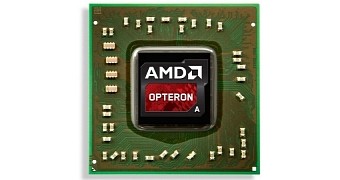Intel may have completely turned away from the idea of ARM-based server chips, especially on the data center and large-scale processing markets, but the same cannot be said about AMD, as the latest announcement will show.
You may or may not know this, but Advanced Micro Devices has been experimenting with ARM-based processors for quite a while.
In fact, the Opteron A1100 Seattle Processor was launched one and a half months ago, give or take, and development kits were already existing at that point.
The Sunnyvale, California-based company has finally made the next step, one which could be the most important ever.
Essentially, it demonstrated the usefulness of its ARM Cortex-A57-based AMD Opteron A-Series processor by getting Apache Hadoop running on it.
Why this is important
Apache Hadoop is a Java-based framework for storage and large-scale data processing. It is one of a set of software applications used by the world's most popular server ecosystems.
Software support has been the greatest barrier between ARM technology and widespread server use, as most programs were (and still are) coded for the x86 architecture.
With AMD backing the tech, now, some palpable waves should be stirred. Especially with the natural advantage that ARM tech has in efficiency.
Of course, the lack of 64-bit support was a problem for a while as well, but with the Opteron A-Series, this is no longer a problem. In AMD's demo, the ARM-based servers can run Apache Hadoop on the Oracle JDK.
Linux fans don't need to feel left out though. Multiple nodes have been proven to be fully capable of running Fedora-based Linux environments from the Red Hat-sponsored community, as well as the OpenSuSE Project.
The curious case of the AMD-ARM partnership
This is one area where AMD could have probably locked horns with NVIDIA on the mobile consumer electronics market, by launching something that could directly oppose NVIDIA. However, nothing of the sort happened.
Then again, AMD does seem hell-bent on stopping its business from being seen as a foil to others. It's been actively trying to stop comparisons between Intel CPUs and its APUs (it even did away with the enthusiast-grade CPU line) and now it's producing server tech that Intel doesn't have and doesn't plan to make either. The refusal to develop a Tegra counter-tactic is an extension of this so-called policy.
Now, we just have to sit back and watch to see if the Seattle A-Series Opteron CPUs catch on with the data center community.

 14 DAY TRIAL //
14 DAY TRIAL //